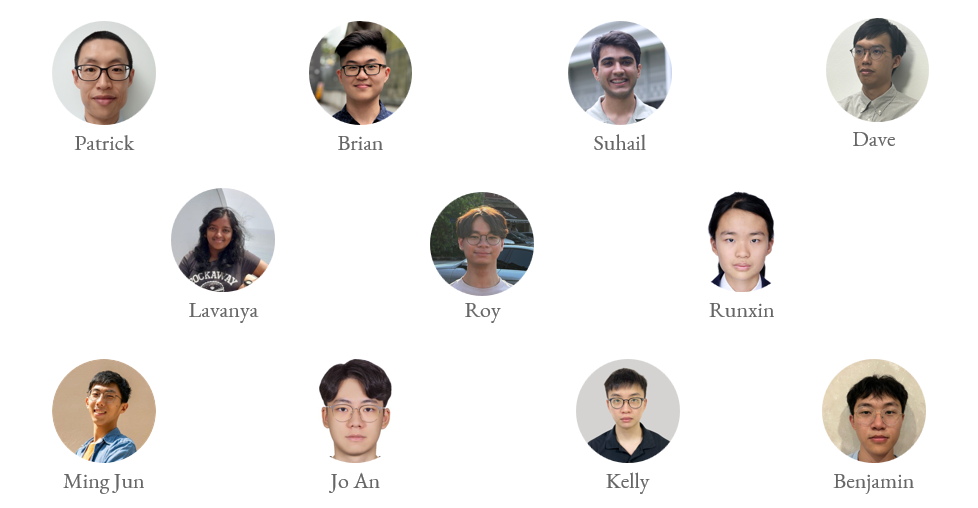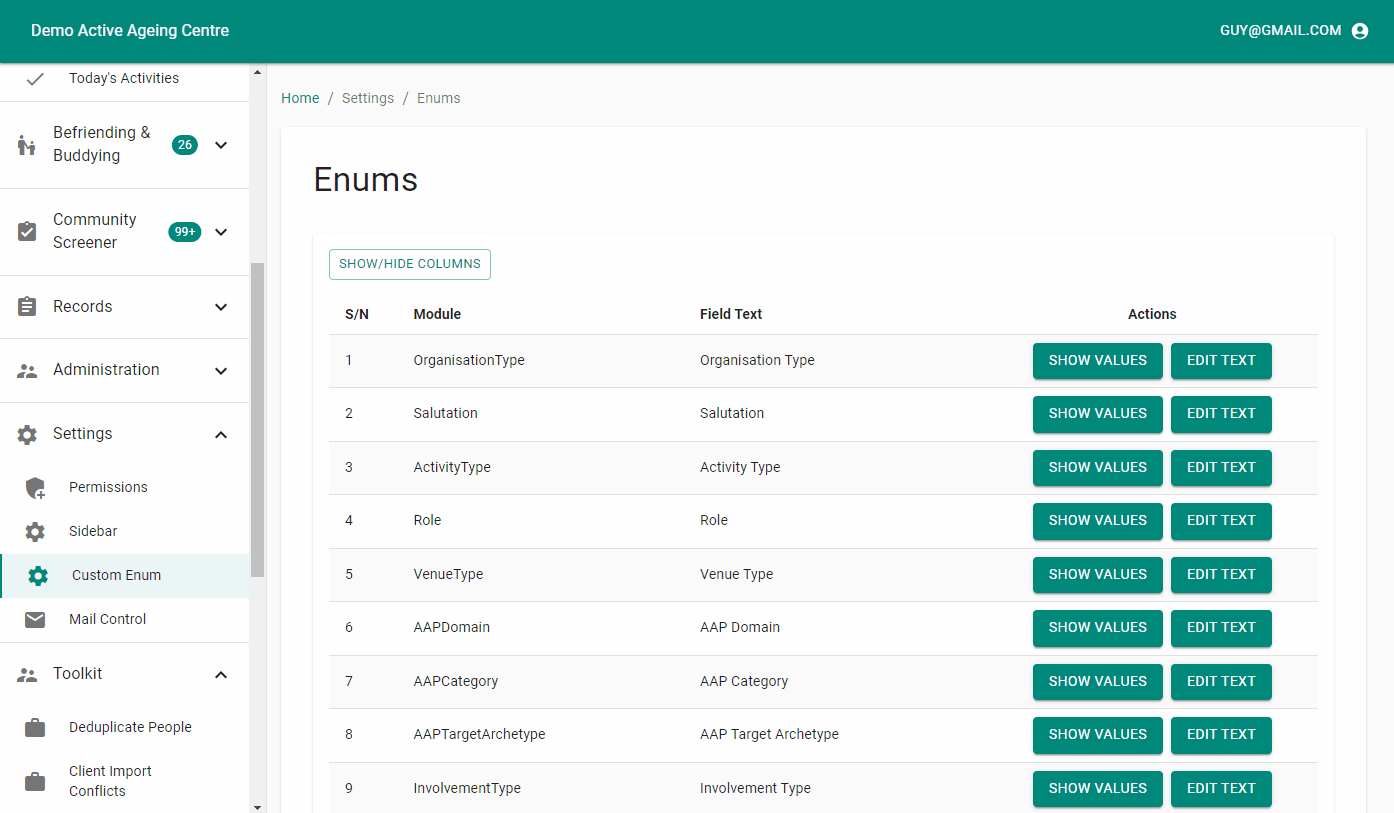Background
The Active Aging Centre (AAC) system is an IT solution developed by CVWO to help our partner agencies, which focus on elderly care, carry out their daily operations more effectively. The system we built dates back to 2007, when CVWO created an IT system for Geylang East Home for the Aged (GEHA) to support their operations and streamline the process of generating reports.
As of 2024, it is being actively used by 13 eldercare centres from GEHA, Care Corner, Sheng Hong Active and FaithActs. .




The AACs serve as a key point of contact for all social-health matters, provide opportunities for volunteering among seniors in their community, and offer the following four main services:

Current Challenges
IT System Qualification Framework
Currently, many AACs face challenges in digitalisation, with some relying on manual tracking systems due to limited IT resources. The situation is further complicated by a fragmented IT landscape, as different IT system providers collect data in non-standard ways. To address these issues, the Ministry of Health (MOH) and the Agency for Integrated Care (AIC) have introduced the AAC IT System Qualification Framework to establish the requirements for IT systems supporting AACs. This framework outlines the four key requirements below:
- Functional Requirements
- Integration Requirements
- Cybersecurity Certification
- AAC IT System Data Portability
In order for us to continue supporting the existing AACs, we need to meet all the framework’s requirements.
Customisation
Different AACs have varying needs, some of which go beyond the basic requirements of the AAC framework. To address this, we need to provide flexible configuration options that allow them to enable the features they need and disable those they don’t. Additionally, we should enable them to customize how they store and manage information based on their specific preferences.
Key Contributions
Client Management
We have developed a complete workflow for managing clients, starting with importing the client list provided by AIC. During implementation, we realised that imported clients might conflict with existing ones in the system. To address this, we added a feature to resolve client data conflicts.
Custom Enums
Different AACs may require customised selection options for specific data fields. For example, they may want to add additional salutation types to the default salutation options. To address this, we have implemented custom enums, allowing AACs to manage and tailor their own selection options.
Charts Module
AAC staff need to be aware of the overall statistics related to the data they have, including client and volunteer profiles, as well as their current progress towards key performance indicators (KPIs) set by the Agency for Integrated Care (AIC). AACs receive funding from AIC based on how well they meet these KPIs. This enables staff to make more informed decisions, such as identifying which KPIs are lacking and where to focus their efforts to improve performance. We have implemented the charts module to support this need.
Audit Log
It is essential for our system to track user activities and the specific changes made by each user to the data. In case any issues arise, the admin user can refer to the audit log to identify the root cause. We have implemented the audit log to support this feature.
Integration Requirement - Report Submission
Currently, all AACs submit their data manually through a web portal, which is a tedious process involving the preparation and submission of all required documents. To streamline and automate this process, our system is required to support the submission of the Age Well SG (ASG) Report to AIC directly through the Centralised API Gateway.
Cybersecurity Requirement
To enhance the security of our system, we have implemented an automatic logout feature after 15 minutes of inactivity. This ensures that if a user is away from their device for an extended period, it cannot be easily accessed by others for malicious activities.
Componentisation on Volunteer Mobile App
n previous years, we implemented componentisation on the desktop site for AAC staff. We have now enhanced this feature to support componentisation on the mobile app used by volunteers. This allows each AAC to select which modules they want to enable for their volunteers. For example, one AAC may choose to activate the Volunteer Management System (VMS) so that their volunteers can access training courses through the app, while another AAC that doesn’t feel the need for this feature can opt to disable it.
Configuration for Individual Modules
We have introduced additional settings that allow the system admin to configure individual modules. This provides the admin with more granular control, enabling them to fine-tune each module beyond simply turning it on or off.
Sidebar Customisation on Volunteer Mobile App
In previous years, we implemented sidebar customisation on the desktop site for AAC staff. We have now extended this feature to the volunteer mobile app. AAC staff can modify the names of the modules enabled for the volunteer app and rearrange their positions. Additionally, they can create folders on the sidebar to organise items more efficiently by grouping related modules or features within these folders.
Google Analytics
Previously, Google Analytics was implemented as a standalone page written in PHP. We have now integrated it into our new AAC system, making it part of the admin dashboard. This allows system admin users to easily view and monitor the usage of AACs within the system.
Project Team

- Patrick Wang Youming (Project Lead, Full-time Staff)
- Brian Choon Wei Hao (Developer, Year 1)
- Suhail Loya (Developer, Year 1)
- Wong Swee Chong, Dave (Developer, Year 1)
- Lavanya Garg (Developer, Year 1)
- Tay Yong Kiat, Roy (Developer, Year 1)
- Cai Runxin (Developer, Year 1)
- Zhang Ming Jun (Developer, Year 1)
- Jo An (Developer, Year 1)
- Wong Jia Yi, Kelly (Developer, Year 1)
- Benjamin Wang Jiayuan (Developer, Year 1)
Afterthoughts
I am grateful for the opportunity to work on CVWO again after 15 years. It has been a thrilling and rewarding experience to lead a group of talented SOC students, all working together to make a positive impact on society!
– Patrick
I was someone with no prior knowledge of SWE, but CVWO put me in an extremely challenging yet enriching environment to grow and discover my potential. I highly recommend it to anyone looking to spend their summer fruitfully and learn skills even beyond coding.
– Brian
CVWO was a valuable learning experience that not only enhanced my technical skills but also significantly developed my soft skills.
– Suhail
CVWO has been a greatly rewarding experience, allowing me to develop my technical skills while contributing to a meaningful cause. It has also provided invaluable insights into the process of software engineering in a real-world context.
– Dave
CVWO taught me that code can be a powerful tool for social change, transforming lines of syntax into real-world impact. Through challenges and triumphs, I’ve grown not just as a developer, but as a member of a community dedicated to making a difference.
– Lavanya
CVWO has shown me how technology can be a force for good. I’m grateful for the opportunity to work alongside such an exceptional team to bring tangible impact to our community.
– Roy
CVWO is a challenging but rewarding experience, and I am glad to work with the talented and hardworking team to help improve AAC system and make the society a better place.
– Runxin
The summer with CVWO has been one of immense growth, learning, and impact. It’s been rewarding to see how our work directly supports the community, and I’m grateful to have been part of this journey.
– Ming Jun
During CVWO, the real-world challenges and teamwork experience have been invaluable in bridging the gap between academic knowledge and software industry practices. Looking ahead, I hope to retain these software engineering principles and continue leveraging technology for social good.
– Jo An
Working in CVWO has been an eye-opening experience. The ability to directly impact people’s lives through technology is incredibly rewarding, and I’m thankful to have been part of such an inspiring team.
– Kelly
CVWO has been a memorable experience from start to finish, offering not only the chance to sharpen my technical skills but also to develop crucial soft skills in software engineering. I’m very grateful for the opportunity to collaborate with a talented and dedicated team of individuals.
– Benjamin
We would like to express our heartfelt gratitude to the following individuals and organisations for their invaluable support and influence throughout our project:
- GIC for their generous support
- Prof. Ben Leong (NUS) for his guidance and mentorship
- GIC GPP Mentors Wincent and Daryl for their guidance











